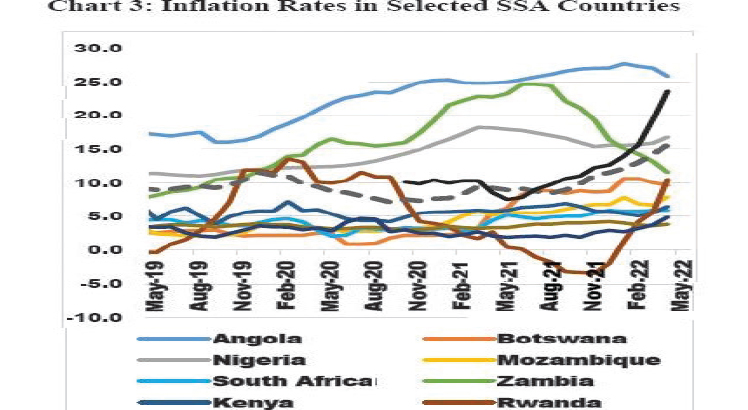Budget set for mid-term review
Treasury says it is set to review budget at mid-term following the negative impact of devaluation and rising inflation.
Ministry of Finance and Economic Affairs position follows an admission by Reserve Bank of Malawi (RBM) that the recent 25 percent devaluation of the kwacha and the increase in domestic fuel prices could exert further pressure on the inflation outlook.
The central bank says this may require a review of the monetary policy to contain further deviations of inflation away from the medium-term objective.

Already, inflation rate has risen to a six-year high, accelerating to 19.1 percent in May 2022, from 15.7 percent the previous month, according to the National Statistical Office (NSO).
In a written response on Tuesday, Ministry of Finance and Economic Affairs Principeal Secretary McDonald Mafuta Mwale said the devaluation and the rising inflation rate will have a huge impact because these formed part of our assumptions.
He said: “A significant component of the national budget is spent on foreign sourced goods and services which means that in kwacha terms the budget will buy less.
“As one way to reposition the budget, Treasury will have to review the budget at mid-term.”
In its recent Malawi Intelligence Report published on Tuesday, RBM said the current sources of inflationary pressures are also posing an additional challenge to an inclusive recovery as they are disproportionally affecting low-income households that spend a much larger share of their income on food items.
Reads the report in part: “The decline in real incomes is particularly more pronounced in developing countries where poverty is more prevalent, wage growth remains constrained and fiscal support measures to alleviate the impact of higher oil and food prices on the vulnerable groups are more limited.
“Surging food inflation is worsening food insecurity and pushing many below the poverty line, as developing countries are still struggling with economic shocks from the pandemic.”
RBM said with the weakened global growth prospects since the advent of the Russia-Ukraine war, which has triggered rising commodity prices on the international markets, all global central banks are currently facing unfavourable prospects for the inflation outlook.
In May, NSO figures showed that food inflation increased by six percentage points to 25.5 percent, reflecting the transmission of input cost pressures to selling prices while non-food inflation rose by one percentage point to 13.2 percent, largely on account of second-round effects of fuel price increase.
Spot-checks in produce markets show that maize is selling between K15 000 and K20 000 per 50 kilogramme (kg) bag or K300 to K400 per kg against the government recommended price of K10 000 per 50 kg bag or K220 per kg.
During the same period last year, maize was selling at an average of K7 000 per 50 kg bag or K140 per kg.
The rise is attributed to sustained price increases as a consequence of the Russia-Ukraine war, which has resulted in elevated global prices for fertilisers and, therefore, the maize grain.
On the other hand, domestic fuel pump prices were adjusted upwards effective June 23 2022 with petrol rising by 44.92 percent to K1 999 per litre, while diesel rose 30.61 percent to K1 920 per litre.
After observing the current trend of rising prices, RBM adjusted upwards the 2022 inflation target to 12.3 percent from 10.4 percent last year.
Treasury, on the other hand, anticipated average inflation rate to remain in single digits at 8.6 percent in 2022, largely reflecting contained food inflation, but seems unlikely to materialise.
Speaking in an interview on Tuesday, Malawi University of Business and Applied Sciences associate professor of economics Betchani Tchereni observed that pressure is mounting on the monetary policy means that interest rates have to be adjusted according to the inflation trends.
“This could affect cost of investment, which is not good for the economy as investment financing needs to be cheaper to create more jobs,” he said.
Economics Association of Malawi executive director Frank Chikuta said not only does inflation add to the uncertainty of doing business, it also worsens the levels of poverty as purchasing power is eroded.
In Malawi, maize, as part of the food component, accounts for about 52 percent of the consumer price index, an aggregate basket of goods and services used in computing inflation.





